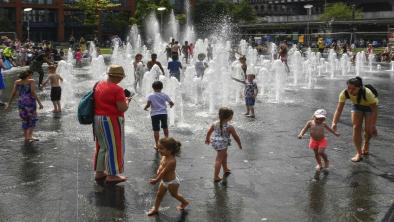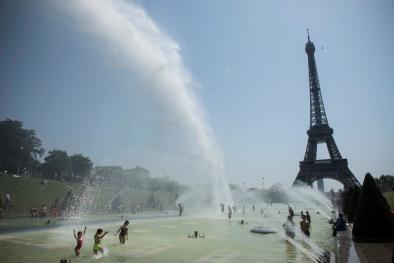Science Source
Climate extremes and climate change: The Russian heat wave and other climate extremes of 2010
- Develops a global perspective on a number of high impact climate extremes in 2010 through diagnostic studies of the anomalies, diabatic heating, and global energy and water cycles that demonstrate relationships among variables and across events
- Finds that natural variability, especially ENSO, and global warming from human influences together resulted in very high sea surface temperatures (SSTs) in several places that played a vital role in subsequent developments
- Record high SSTs in the Northern Indian Ocean in May 2010, the Gulf of Mexico in August 2010, the Caribbean in September 2010, and north of Australia in December 2010 provided a source of unusually abundant atmospheric moisture for nearby monsoon rains and flooding in Pakistan, Colombia, and Queensland
- The resulting anomalous diabatic heating in the northern Indian and tropical Atlantic Oceans altered the atmospheric circulation by forcing quasi-stationary Rossby waves and altering monsoons
- The anomalous monsoonal circulations had direct links to higher latitudes: from Southeast Asia to southern Russia, and from Colombia to Brazil
- Strong convection in the tropical Atlantic in northern summer 2010 was associated with a Rossby wave train that extended into Europe creating anomalous cyclonic conditions over the Mediterranean area while normal anticyclonic conditions shifted downstream where they likely interacted with an anomalously strong monsoon circulation, helping to support the persistent atmospheric anticyclonic regime over Russia
- This set the stage for the “blocking” anticyclone and associated Russian heat wave and wild fires. Attribution is limited by shortcomings in models in replicating monsoons, teleconnections and blocking
Related Content
Headline

Jul 29, 2019 | The New York Times
As Extreme Heat Becomes New Normal in Europe, Governments Scramble to Respond
Science Source
| Frontiers in Marine Science
Severe Continental-Scale Impacts of Climate Change Are Happening Now: Extreme Climate Events Impact Marine Habitat Forming Communities Along 45% of Australia’s Coast
Babcock, Russell C., Bustamante et al
Headline

Jul 29, 2019 | The Weather Channel
Europe Swelters Under Second Heat Wave of Summer; Twenty Children Fall Ill in Netherlands
Headline

Jul 26, 2019 | Washington Post
Heat wave smashes temperature records across Europe


